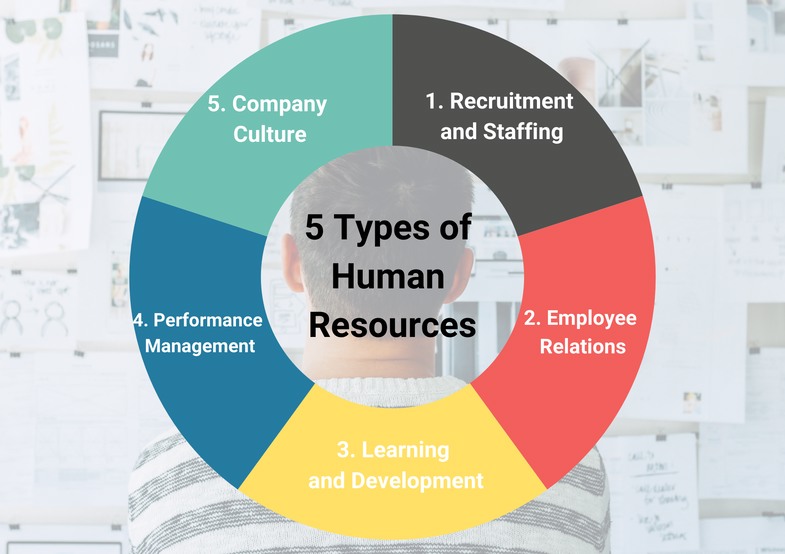Human resources department is a very important department in every company. This department plays a critical role in the organization they are in. They work in a wide range of areas from salary payments of company employees to training planning. People working in human resources need to be reliable and ethical. Because they are responsible for everyone in the company.
Let’s give a small example. Imagine that a factory worker receives a salary of 2300$ per month. In February 2024, if the worker’s account is credited with a salary of $2100, a problem arises. The main source of the problem here is the human resources department and the accounting department. Therefore, they have a lot of responsibility. This is just one example. Examples can be multiplied.
We have written a detailed content on human resources. After reading our content, you will find answers to many questions about human resources.
Contents
- 1 What is Human Resources (HR)?
- 2 Why Is Human Resources Important?
- 3 What Are Human Resources Roles and Titles?
- 4 What Are 5 Types of Human Resources?
- 5 What Are the Human Resources Duties and Responsibilities?
- 6 What Are Human Resources Strategies?
- 7 What Skills Do You Need to Work in Human Resources?
- 8 Human Resources-Related Videos
What is Human Resources (HR)?
Human Resources (HR) undertakes crucial roles in organizations by managing the people who work in them. It is a strategic and operational function that focuses on employee well-being, development, and productivity. HR professionals are responsible for a variety of tasks aimed at ensuring a harmonious working environment and aligning organizational goals with individual objectives.
HR’s primary goal is to attract, recruit, and retain qualified employees. This includes creating job descriptions, advertising positions, conducting interviews, and selecting the most suitable candidates. HR professionals also work on developing compensation and benefits packages to attract the best talent and ensure employee satisfaction.
HR also plays a big role in employee relations, ensuring fair treatment and handling grievances. They create policies, procedures, and guidelines to promote a decent working environment. HR department employees often conduct disciplinary proceedings, resolve disputes, and promote positive employee relations.
In summary, human resources encompasses various important aspects of managing people within an organization. HR professionals play a vital role in attracting, developing, and retaining talented employees, promoting a positive work culture, and ensuring legal compliance. By integrating HR strategies with business objectives, organizations can create a productive work environment that benefits both employees and the organization as a whole.

Why Is Human Resources Important?
The importance of human resources, which undertakes very important roles in companies, are as follows;
- Recruitment and Talent Acquisition: HR is responsible for finding and hiring the right people for the organization. By conducting thorough recruitment processes, HR ensures that the workforce is skilled, diverse, and capable of driving the company’s success.
- Employee Development and Training: HR develops and implements training programs to enhance employees’ skills, knowledge, and productivity. They also promote employee engagement and career growth opportunities, fostering a positive work environment.
- Employee Relations: HR acts as a mediator between employees and management, resolving conflicts and maintaining positive relationships. They also handle employee grievances and ensure fair and equitable treatment for all.
- Benefits and Compensation: HR manages employee benefits, such as healthcare, retirement plans, and leave policies. They ensure competitive compensation packages to attract and retain talented individuals.
- Compliance and Legal Responsibilities: HR ensures that the organization complies with relevant laws and regulations, such as labor laws, health and safety regulations, and equal employment opportunity guidelines. They keep policies updated and mitigate legal risks.
- Organizational Culture and Employee Engagement: HR plays a vital role in shaping the company’s culture and values. They develop strategies to foster employee engagement, promote diversity and inclusion, and create a positive work environment.
- Organizational Performance and Strategy: HR aligns HR strategies with the overall business goals, contributing to organizational success. They provide insights and data-driven solutions to improve performance, productivity, and efficiency.
In conclusion, human resources is critical because it ensures that the right people are in the right positions, supports employee development, manages relationships, ensures legal compliance, and contributes to the overall success and culture of the organization.

What Are Human Resources Roles and Titles?
Human resources roles and titles contribute to the overall function of managing an organization’s workforce. These roles and titles may vary depending on the size and structure of the company. But generally include the following:
- HR Manager: The HR Manager oversees the HR department and is responsible for developing and implementing HR strategies that align with the organization’s goals. They often serve as a strategic partner to senior management and handle tasks such as employee relations, policy development, and talent management.
- Recruiter: Recruiters are tasked with finding and attracting qualified candidates for job vacancies within the organization. They create job postings, screen resumes, conduct interviews, and make recommendations for hiring decisions. They play a vital role in ensuring the company has a skilled and talented workforce.
- Employee Relations Specialist: This role focuses on maintaining positive relationships between the company and its employees. People in this position deal with issues such as problem-solving, performance management, and employee engagement. They strive to create a harmonious work environment and address any concerns or issues promptly.
- Compensation and Benefits Specialist: These professionals are responsible for designing and implementing compensation and benefits packages for employees. They conduct research on industry standards, analyze data, and make recommendations to ensure competitive and fair compensation. They also manage employee benefits programs, such as healthcare and retirement plans.
- Training and Development Specialist: This role focuses on enhancing the skills and knowledge of employees. Training and Development Specialists assess employee development needs, design training programs, and deliver workshops or seminars. They play a crucial role in helping employees reach their full potential and contribute to the growth of the organization.
- HR Generalist: An HR Generalist is a versatile role that handles various HR functions. They may be involved in recruitment, training, employee relations, and other HR activities as needed. This role requires a broad understanding of HR principles and the ability to adapt to different situations.
- HR Coordinator/Administrator: HR Coordinators or Administrators provide administrative support to the HR department. They assist with tasks such as maintaining employee records, processing paperwork, scheduling interviews, and coordinating HR programs or events. Their organizational skills and attention to detail are essential in ensuring smooth HR operations.
It is important to note that job titles and responsibilities may differ between organizations. Some companies may have specialized roles such as HR Business Partner or HR Analyst, while others may combine multiple responsibilities into a single role. The specific needs and priorities of the organization will greatly influence the structure and titles within the HR department.

What Are 5 Types of Human Resources?
1) Recruitment and Staffing
Recruiting and staffing are two interdependent yet distinct aspects of the hiring process. While recruiting involves the search and acquisition of potential candidates for a job, staffing encompasses a broader range of activities aimed at building and maintaining a skilled workforce. The selection process, which is a crucial part of staffing, helps identify the most suitable candidate for a position.
To attract and hire top talent, companies can utilize either internal or external recruiting teams. Internal recruitment offers opportunities for current employees to advance within the organization, while external recruitment methods include job postings, employee referrals, and recruitment programs, among others. Overall, staffing and recruiting work hand in hand to ensure that companies have the right people in the right roles to achieve their goals.
2) Employee Relations
Based on a recent study conducted by HBR in 2021, it was found that a significant majority of workers, approximately 89 percent, expressed dissatisfaction with their jobs. Moreover, 85 percent of the respondents reported a decline in their overall well-being, while 56 percent stated that their job demands had increased. These statistics can have detrimental effects on employee engagement, and productivity.
The pulse of the organization should be comprehensively understood by conducting internal surveys and organizing meetings with employees. Additionally, HR plays a crucial role in establishing systems that foster a healthy workplace culture, addressing and preventing issues related to employee engagement and burnout.
Conflict resolution is also a significant aspect of employer-employee relations. This department can contribute to the process by setting communication standards that promote transparency and openness. This can be achieved through various means, including weekly one-on-one meetings between managers and their direct reports, monthly skip-level meetings, quarterly town halls, and Q&As with senior leaders, among others.
3) Learning and Development
Learning and development, often referred to as L&D, is an integral part of the HR department. Its primary objective is to enhance the skills and knowledge of employees, enabling them to excel in their current positions or progress to higher roles within the organization. The L&D team is responsible for organizing various training programs and professional development opportunities, which can range from onboarding new employees to fostering career growth, leadership development, and courses.
Depending on the organization’s resources and budget, L&D may also collaborate with other departments, such as IT, to facilitate change management and communication during the implementation of new systems that require training or upskilling.
4) Performance Management
Every organization has its performance management process. This process usually involves evaluating the performance of employees against predetermined goals and expectations. When executed successfully, this process can enhance employees’ sense of connection between their work and its impact on the overall business outcomes and mission of the organization.
Efficiently implemented performance management programs promote accountability and transparency, fostering alignment between leadership, management, and employees. This alignment, in turn, contributes to a positive workplace culture, effective communication, high employee engagement, and other essential factors that drive productivity in the workplace.
5) Company Culture
The responsibility of building company culture does not solely rest on the shoulders of HR departments. However, HR plays a unique role in setting the tone and nurturing a positive workplace culture within an organization. From the initial stages of recruitment to the establishment of the employer-employee relationship, HR team members are tasked with effectively communicating the company’s mission, values, and culture to potential candidates.
Moreover, they are responsible for attracting and recruiting individuals who align well with the organization’s culture. HR’s impact on culture goes beyond the hiring process. This is because they can also be involved in various aspects of employee engagement, such as managing employee groups, solving problems, facilitating employee communication, organizing company events, and implementing professional development programs.

What Are the Human Resources Duties and Responsibilities?
The roles and responsibilities of human resources professionals are critical for many companies. Some of the duties and responsibilities of HR are as follows;
- Recruitment and selection: HR professionals are responsible for attracting and hiring suitable candidates for job positions within the organization. They conduct job analyses, create job descriptions, and coordinate the recruitment process, including resume screening, interviewing, and making job offers.
- Employee onboarding and orientation: HR ensures that new employees have a smooth transition into the organization through onboarding and orientation programs. This includes introducing them to company policies, procedures, and culture, as well as providing necessary training.
- Employee relations and communication: HR professionals serve as a bridge between employees and management, fostering positive employee relations. They address employee grievances, mediate conflicts, and provide counseling and support. HR also facilitates effective communication channels within the organization.
- Performance management: HR sets up performance management systems, including setting performance goals, conducting regular performance evaluations, and providing feedback and recognition to employees. They assist in identifying performance improvement areas and developing employee development plans.
- Compensation and benefits: HR manages employee compensation and benefits programs, ensuring competitive and fair pay structures. They administer employee benefits, such as health insurance, retirement plans, and leave policies, and keep up-to-date with legal compliance requirements.
- Training and development: HR professionals coordinate and facilitate training and development programs to enhance employee skills and knowledge. They identify training needs for employees and create the necessary training programs.
- Compliance with labor laws and regulations: HR ensures compliance with labor laws and regulations to protect the rights of employees and the organization. They stay updated on legal requirements and handle issues related to employment contracts, workplace safety, and diversity and inclusion.
- HR administration and record keeping: HR professionals maintain accurate and confidential employee records, including personal information, performance evaluations, and disciplinary actions. They also handle administrative tasks such as payroll processing, employee benefits administration, and record keeping.

What Are Human Resources Strategies?
Human resources strategies refer to the strategies developed by organizations to effectively manage and utilize their human resources. These strategies are designed to align human resources practices with the overall goals of the organization.
Here are some key elements of human resources strategies:
- Recruitment and Selection: An effective HR strategy includes a comprehensive approach to selecting the right candidates for the organization. This involves determining the necessary competencies required for each position and using various recruitment methods to attract qualified individuals.
- Training and Development: A strong focus on training and development is essential for HR strategies. This includes assessing the training needs of employees, designing training programs, and providing opportunities for career advancement.
- Performance Management: HR strategies should include processes for managing employee performance. This involves setting clear performance goals, providing feedback, conducting performance evaluations, and rewarding high-performing employees.
- Employee Engagement: Creating a positive work environment and fostering employee engagement is crucial for HR strategies. This can be achieved through effective communication, recognition programs, and opportunities for employee involvement.
- Compensation and Benefits: HR strategies should include fair pay and benefits to attract and retain the best talent. This includes determining appropriate salary structures, designing incentive programs, and providing benefits such as health insurance, and retirement plans.
- Diversity and Inclusion: In today’s diverse workforce, HR strategies need to focus on creating an inclusive and diverse workplace. This includes ensuring equal opportunities to recruit and retain employees from diverse backgrounds.
- Succession Planning: HR strategies should include succession planning to ensure the long-term sustainability of the organization. This process includes identifying potential future leaders and developing plans for smooth appointments to other key roles.
Companies can effectively manage their workforce by implementing human resources strategies. Human resources strategies include but are not limited to. Various strategies can be developed according to the needs of the company.

What Skills Do You Need to Work in Human Resources?
Working in human resources requires a unique set of skills to effectively handle various responsibilities. Here are some essential skills that individuals need to possess to succeed in this field:
- Communication: As the name suggests, the main element of this department is people. Therefore, they need to have strong communication skills. They need to effectively communicate with employees, listen to their concerns, and provide guidance. Additionally, HR professionals must have excellent written communication skills for drafting policies, procedures, and reports.
- Problem-solving: HR professionals frequently encounter complex situations that require quick thinking and problem-solving abilities. They need to identify issues, analyze different perspectives, and develop effective solutions to ensure employee satisfaction and organizational success.
- Ethical Behavior: Maintaining integrity and fairness is essential for maintaining trust and credibility within the company. Professionals working in this field are required to act ethically as they have important information and make critical decisions.
- Analytical Skills: HR professionals often deal with huge amounts of data. They must be able to analyze and interpret this data effectively. They need to use data to make informed decisions, identify trends, and develop strategies for employee development.
- Organizational Skills: HR professionals handle multiple tasks simultaneously, such as employee onboarding, benefits administration, training programs, and performance evaluations. Strong organizational skills are necessary to manage time, prioritize tasks, and ensure that all HR operations run smoothly.
- Knowledge of Employment Laws: Understanding and staying updated on employment laws and regulations is essential for HR professionals. They must ensure that all HR practices align with legal requirements to minimize potential risks and maintain compliance.
- Adaptability: HR professionals need to adapt to ever-changing workplace dynamics, policies, and technology. Being adaptable allows them to embrace new strategies, tools, and trends to enhance HR functions and meet evolving organizational needs.
- Continuous Learning: Given the dynamic nature of HR, professionals should have a thirst for continuous learning. Staying updated on industry trends, obtaining relevant certifications, and participating in professional development opportunities will ensure HR professionals remain competent and effective in their roles.
Human Resources-Related Videos
We also want to share with you videos about human resources. This video answers your questions in the best way. You can click HERE for more videos.
